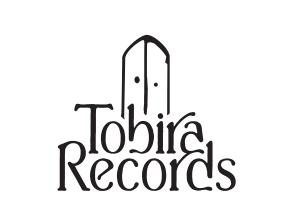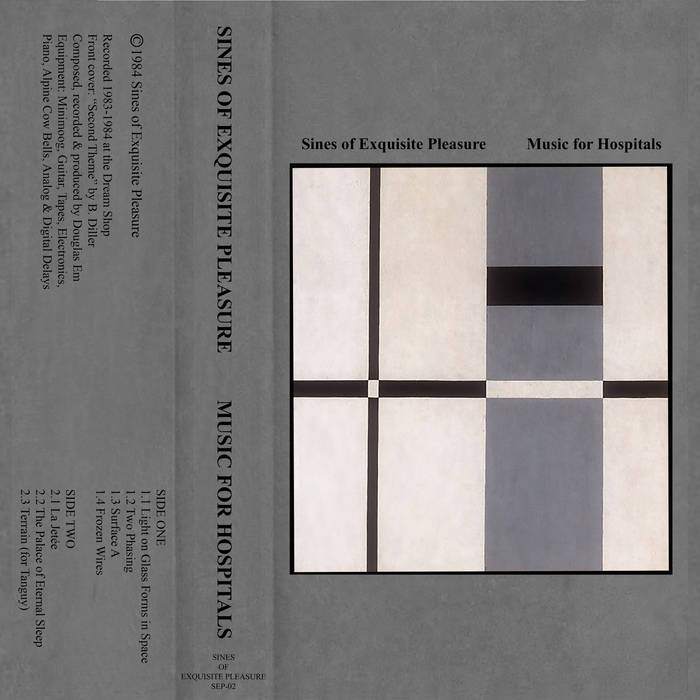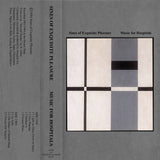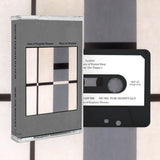Sines of Exquisite Pleasure // Music for Hospitals TAPE
- Availability:
※当店限定販売です
1980年代に人知れず活動していたアメリカ・テネシーのアンビエント作家Sines of Exquisite Pleasureが、2024年2月に同国ケンタッキーのポストニューエイジレーベルFantasy Audio Magazineから20本限定でリリースした再発カセットです。(オリジナルは1984年リリース)
ギターとMoog、エフェクター、テープによるLo-Fiニューエイジ・アンビエントドローン7曲を収録。廃盤です。
カセットのみでの発表となります。
レーベルその他作品はこちら /// Click here to see more Fantasy Audio Magazine releases available at Tobira.
----------------------
Cassette in norelco case. Edition of 20.
Tracklist:
- Light on Glass Forms in Space 10:22
- Two Phasing 03:08
- Surface A 05:38
- Frozen Wires 02:47
- La Jetée 08:15
- The Palace of Eternal Sleep 08:20
- Terrain (for Tanguy) 04:06
++
Fantasy Audio Magazine:
"
Originally released on compact cassette in December 1984, "Music for Hospitals" was Douglas Em's second cassette release under the nom de plume Sines of Exquisite Pleasure. Limited to 100 copies and for the most part privately distributed, "Music for Hospitals" explored Em's interest in the "systems music" of Terry Rily and Philip Glass as well as the "ambient" experiments of Brian Eno and Robert Fripp.
Recorded with a Teac 3440 reel-to-reel 4-track, Em's minimalist sound palette consisted primarily of a Gibson SG guitar and a Minimoog synthesizer. An ancient Baldwin upright spinet piano and five traditional Alpine cow bells of various sizes were also employed on several tracks. In addition, several analog and digital delays and a Nakamichi tape deck were integral tools used in the sound construction process. The seven tracks on "Music for Hospitals" each represent Em's fascination with cyclical sound structures and the inherent randomness of probability modeling as it applies to the allocation and distribution of sound sources in the stereo field. According to Brian Westgate in a 1985 review of "Music for Hospitals" in Arttek Magazine, "The patterns and cycles of change in the pieces on "Music for Hospitals" are akin to the arcane numerological system found in the 'I Ching' where structure and meaning is produced by random events that conform to a rigorously stochastic method of mathematical probability." In retrospect, "Music for Hospitals" is an early lineal descendant of the "ambient" sound experiments initiated by Brian Eno in the late 1970s and Robert Fripp's loop-obsessed "frippertronic" soundscapes of the early 1980s.
Douglas Em (b. 1961, Nashville, TN) studied music and film production at the University of South Carolina at Columbia, and later taught electronic music composition and music theory at Concordia University in Portland, OR. His works include "Modular Systems" (1982), "Music for Hospitals" (1984), "Cinema Zero" (1988), "Energy Structures for Guitar & Electronic Devices" (1993), and "Music for the Films of Maya Deren" (1997). He has also produced film pieces and installation performances for Vanderbilt University, Reed College, the Von Braun Center, and the South Carolina Commission for the Arts."
Artist : Sines of Exquisite Pleasure
Label : Fantasy Audio Magazine
※当店限定販売です
1980年代に人知れず活動していたアメリカ・テネシーのアンビエント作家Sines of Exquisite Pleasureが、2024年2月に同国ケンタッキーのポストニューエイジレーベルFantasy Audio Magazineから20本限定でリリースした再発カセットです。(オリジナルは1984年リリース)
ギターとMoog、エフェクター、テープによるLo-Fiニューエイジ・アンビエントドローン7曲を収録。廃盤です。
カセットのみでの発表となります。
レーベルその他作品はこちら /// Click here to see more Fantasy Audio Magazine releases available at Tobira.
----------------------
Cassette in norelco case. Edition of 20.
Tracklist:
- Light on Glass Forms in Space 10:22
- Two Phasing 03:08
- Surface A 05:38
- Frozen Wires 02:47
- La Jetée 08:15
- The Palace of Eternal Sleep 08:20
- Terrain (for Tanguy) 04:06
++
Fantasy Audio Magazine:
"
Originally released on compact cassette in December 1984, "Music for Hospitals" was Douglas Em's second cassette release under the nom de plume Sines of Exquisite Pleasure. Limited to 100 copies and for the most part privately distributed, "Music for Hospitals" explored Em's interest in the "systems music" of Terry Rily and Philip Glass as well as the "ambient" experiments of Brian Eno and Robert Fripp.
Recorded with a Teac 3440 reel-to-reel 4-track, Em's minimalist sound palette consisted primarily of a Gibson SG guitar and a Minimoog synthesizer. An ancient Baldwin upright spinet piano and five traditional Alpine cow bells of various sizes were also employed on several tracks. In addition, several analog and digital delays and a Nakamichi tape deck were integral tools used in the sound construction process. The seven tracks on "Music for Hospitals" each represent Em's fascination with cyclical sound structures and the inherent randomness of probability modeling as it applies to the allocation and distribution of sound sources in the stereo field. According to Brian Westgate in a 1985 review of "Music for Hospitals" in Arttek Magazine, "The patterns and cycles of change in the pieces on "Music for Hospitals" are akin to the arcane numerological system found in the 'I Ching' where structure and meaning is produced by random events that conform to a rigorously stochastic method of mathematical probability." In retrospect, "Music for Hospitals" is an early lineal descendant of the "ambient" sound experiments initiated by Brian Eno in the late 1970s and Robert Fripp's loop-obsessed "frippertronic" soundscapes of the early 1980s.
Douglas Em (b. 1961, Nashville, TN) studied music and film production at the University of South Carolina at Columbia, and later taught electronic music composition and music theory at Concordia University in Portland, OR. His works include "Modular Systems" (1982), "Music for Hospitals" (1984), "Cinema Zero" (1988), "Energy Structures for Guitar & Electronic Devices" (1993), and "Music for the Films of Maya Deren" (1997). He has also produced film pieces and installation performances for Vanderbilt University, Reed College, the Von Braun Center, and the South Carolina Commission for the Arts."
Artist : Sines of Exquisite Pleasure
Label : Fantasy Audio Magazine







